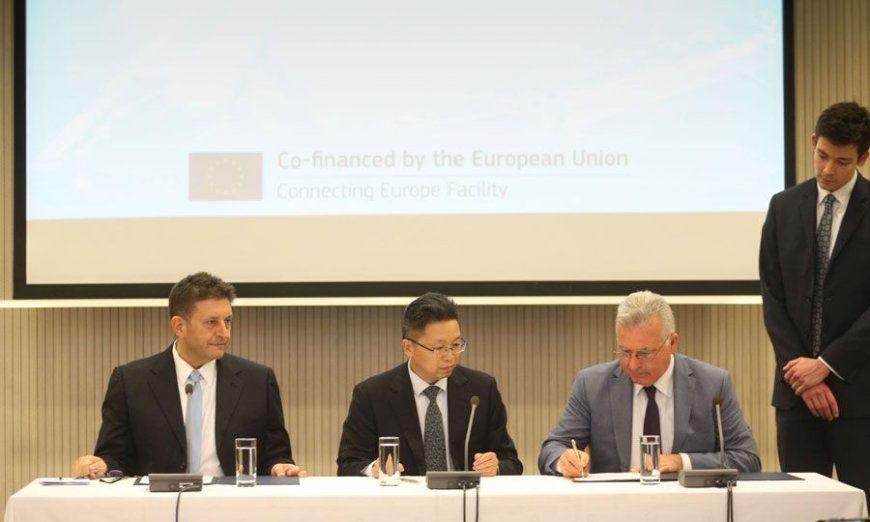Chinese-Led Consortium Withdraws from Cyprus Natural Gas Terminal Project Amid Financial Disputes
A significant setback has occurred in Cyprus’ energy sector as the CPP-Metron Consortium, a Chinese-led group, has withdrawn from its contract to build the island nation’s first natural gas import terminal. The consortium cites non-payment by the Cypriot government for work completed this year as the primary reason for its departure.

A significant setback has occurred in Cyprus’ energy sector as the CPP-Metron Consortium, a Chinese-led group, has withdrawn from its contract to build the island nation’s first natural gas import terminal. The consortium cites non-payment by the Cypriot government for work completed this year as the primary reason for its departure.
On Thursday, CPP-Metron issued a statement asserting that the Cypriot government had failed to honor financial commitments despite assurances made during a March meeting chaired by President Nikos Christodoulides. “No contractor can be expected to work indefinitely on credit,” the consortium said, emphasizing that such terms were not part of the original agreement.
The Cyprus government has yet to officially respond to the consortium's withdrawal. However, a source with intimate knowledge of the project, who requested anonymity due to restrictions on discussing the matter publicly, indicated that the decision to terminate the contract was mutually agreed upon. The source suggested that CPP-Metron's financial difficulties and miscalculations, exacerbated by the COVID-19 pandemic and geopolitical tensions, were significant factors in the project's collapse.
Financial Strains and Project Challenges
The 289 million euro ($319 million) terminal, located on Cyprus' southern coast, began construction in July 2020 with an initial completion target of mid-2022. The project, funded in part by a 101 million euro ($110 million) European Union grant, was intended to mark Cyprus' transition from crude oil dependency to cleaner, more cost-effective natural gas. The terminal was projected to reduce power generation costs by 15%-25% and cut Cyprus' carbon emissions by 30%.
The terminal includes a specialized tanker ship from Singapore, retrofitted to convert liquefied natural gas (LNG) back into gaseous form, as well as a jetty and pipelines designed to deliver gas to the Vasilikos power plant. The project was also expected to facilitate the use of natural gas from newly discovered fields off Cyprus' coast, where major energy companies like ExxonMobil, Chevron, Eni, and Total are conducting exploration.
According to the official, the consortium's financial woes led to the dismissal of two key subcontractors and a halt in construction activities. CPP-Metron’s financial instability was further compounded by underbidding competitors and subsequent budgetary overruns, which became untenable amidst the global economic disruptions of recent years.
Disputes and Delays
CPP-Metron has accused Cyprus' Natural Gas Infrastructure Company (ETYFA) of complicating the project by demanding additional, unforeseen work and obstructing the delivery of the tanker ship, named ETYFA Prometheas. The consortium claimed that ETYFA's actions amounted to "weaponizing payments" and accused the company of pursuing unnecessary projects that were beyond the scope of the original contract.
In contrast, the Cypriot official pointed out that delays in the project's completion were primarily due to the consortium’s financial problems rather than external factors. The ship, still incomplete, was cited as an example of the project’s ongoing issues.
Next Steps and Future Prospects
With the termination of the contract, the Cypriot government is now positioned to seek new subcontractors to finish the onshore terminal and jetty. Officials are optimistic that these tasks could be completed within a 10-month timeframe, potentially allowing the project to proceed without significant further delay.
This development comes at a crucial time for Cyprus, as it seeks to bolster its energy security and reduce its reliance on imported oil. The completion of the natural gas terminal is seen as a critical step towards achieving these goals and enhancing the island's role in regional energy dynamics.
The fallout from the consortium’s withdrawal highlights the complexities of large-scale infrastructure projects, particularly in a volatile economic and geopolitical climate. As Cyprus navigates this setback, attention will be focused on how swiftly it can recover and what impact, if any, this will have on its broader energy strategy.













































